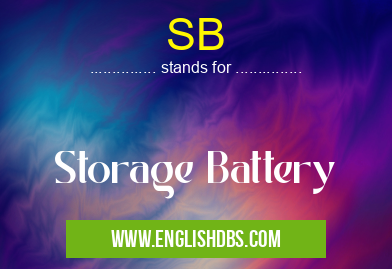What does SB mean in CONSTRUCTION
Storage Batteries, or SBs, are the perfect power source for a diverse array of energy storage needs. SBs have been around since the late 19th century and are still used in a variety of markets such as renewable energy, automotive, and consumer electronics. There is an increasing demand for reliable and efficient SBs as more people become aware of the environmental benefits of using these batteries over other forms of power sources.

SB meaning in Construction in Miscellaneous
SB mostly used in an acronym Construction in Category Miscellaneous that means Storage Battery
Shorthand: SB,
Full Form: Storage Battery
For more information of "Storage Battery", see the section below.
What is a Storage Battery?
A Storage Battery (SB) is an electrochemical device used to store electric energy in its chemical form. This stored energy can later be released as electricity on demand. A battery's capacity is measured by how much electrical charge it can hold and for how long it can hold it. Generally, SBs are made up of multiple cells connected together in a series or parallel arrangement to allow them to store more charge than one cell alone could provide. SBs have a wide range of applications depending on their size and type. They can be used as backup power sources during emergency situations or provide continuous electricity in remote areas not connected to the grid. They're also frequently used in renewable energy systems such as solar PV arrays or wind turbines that have varying levels of energy production throughout the day. Furthermore, with many modern vehicles now being equipped with Lithium-ion batteries, there has been an increase in popularity for these types of SBs due to their high capacity and light weight compared to Lead-acid batteries which were traditionally used in cars before them.
Essential Questions and Answers on Storage Battery in "MISCELLANEOUS»CONSTRUCTION"
What is a storage battery?
A storage battery, also known as a rechargeable battery, is an electrical energy storage device that stores chemical energy and releases it as electrical energy. Storage batteries are commonly used in devices such as laptops, cell phones, flashlights and more.
How do storage batteries work?
Storage batteries use a reversible chemical reaction to convert stored chemical energy into electricity. During the charging process, electricity is passed through the battery cells, causing ions to move between the electrodes. This creates an electric current which charges the battery. During discharge, the same process is reversed and electricity is generated by the movement of ions within the cell.
What materials are storage batteries made from?
Storage batteries are typically made up of two or more electrochemical cells containing various materials such as lead acid, nickel cadmium (NiCd), nickel metal-hydride (NiMH), lithium-ion (Li-ion) and others. Each type of material offers different properties such as power output and capacity, allowing for better performance in various applications.
How long do storage batteries last?
The lifespan of a storage battery depends on its type and capacity, as well as on how it is used and maintained. Generally speaking, Li-ion batteries tend to have the longest lifespans with some lasting up to 10 years under normal usage conditions. NiCd and NiMH cells can last up to 5 years whereas lead acid can last around 3 years with proper maintenance.
Are there any safety precautions when using a storage battery?
Yes! When handling or charging a storage battery you should always take certain safety measures such as wearing protective eyewear and gloves, ensuring that no circuits are active before connecting or disconnecting wires from terminals and never disassembling or tampering with the device itself.
Is it safe to leave my storage battery unused for long periods of time?
Unused lithium-ion batteries will gradually lose their charge over time regardless of temperature conditions so it's best not to leave them idle for extended periods because this could compromise their performance over time due to degradation caused by self-discharge.
Can I charge my laptop's storage battery while using it?
In most cases yes! Although you should be careful not to put too much strain on your laptop while charging since this could inhibit performance or cause damage in extreme cases. If possible try leaving your laptop plugged in overnight instead when possible.
Are there any signs that indicate when I need to replace my laptop's storage battery?
Generally speaking if your laptop's charge drops quickly or if you find yourself needing to charge more frequently then this could be an indicator that your device's battery has reached its end of life cycle.
Final Words:
In conclusion, Storage Batteries (SBs) are becoming increasingly popular due to their ability to store large amounts of electrical charge reliably and efficiently over time. Their use has expanded into various markets such as renewable energy systems, automotive/transportation applications, and consumer electronics as well as traditional backup power solutions. With advances in battery technology continuing at pace, this trend looks set to continue long into the future.
SB also stands for: |
|
| All stands for SB |
